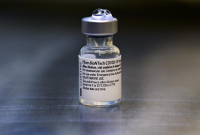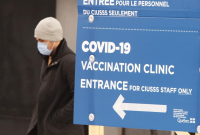Support strong Canadian climate journalism for 2025
Newly arriving refugees will have the cost of their mandatory hotel quarantines and COVID-19 tests covered by the federal government.
Word the cost will be removed from the shoulders of private sponsors comes just days before tougher border measures are set to go into place: as of Monday, most incoming travellers to Canada are required to stay for up to three nights in government-approved hotels while they await the results of COVID-19 tests.
The new rules are meant to guard against further spread of COVID-19 and discourage travel. They are a response to more contagious new variants of the novel coronavirus circulating at the same time some Canadians are ignoring government advice and heading south for winter.
But returning snowbirds aren't the only ones getting on planes bound for Canada.
Thousands of refugees are also awaiting their own flights as the pace of resettlement efforts begins to pick up after pandemic-related restrictions severely curtailed that work last year.
Despite planning for 30,000 refugees to be resettled in Canada in 2020, in the end, only 9,000 arrived.
To sponsor just one person, groups have to raise around $13,500 to cover the refugee's first year in Canada, though they often raise far more to adequately support newcomers, a process that can take groups months if not years.
The fact that travellers are having to pay out of their own pockets for hotels and COVID-19 tests had sponsors concerned about how they'd find the money at the last minute.
Many sponsors were dismayed last month when the new measures were unveiled that there was no carve-out for vulnerable groups, and it wasn't until midday Wednesday they were finally told of the plan: Ottawa will pick up the tab.
"It is a good outcome, under the circumstances," said Sabine Lehr, the chair of the Canadian Refugee Sponsorship Agreement Holders Association, which represents 118 groups involved in the private sponsorship of refugees.
"Of course, we do not know yet what practical issues may or may not arise as these new measures roll out, but we are pleased that the government recognizes that charging the costs of the (point of entry) hotel stay to refugees or their sponsors would put an undue burden on them."
The government was already paying for pre-departure COVID-19 testing for refugees, and had also been paying hotel bills for some who didn't have safe spaces to quarantine in upon arrival.
When the new measures begin Monday, resettled refugees won't be in the same hotels as Canadians returning home who must book their own places to stay (from a list of approved hotels that, as of Thursday afternoon, had not been posted).
Refugee accommodations are being handled by the government and resettlement organizations, and while the quarantine will be managed the same way, newcomers will also have access to added services, including counselling and translators.
The government will also pay for the repeat COVID-19 test now required 10 days after the first one.
No price tag has been applied to the program yet.
A spokesman for Immigration Minister Marco Mendicino said the procedures are in place to ensure Canada can still welcome refugees, while also slowing the spread of COVID-19.
“Welcoming refugees speaks to who are as Canadians: open, generous and compassionate," Alexander Cohen said in an email.
"That’s why even during a pandemic, we continue to welcome the world’s most vulnerable."
While refugees are not exempt from the mandatory quarantine in hotel, some others are.
They include those who are being allowed into Canada to be with loved ones near the end of life, and those who are returning from receiving essential medical treatment abroad.
This report by The Canadian Press was first published Feb. 18, 2021.





Comments